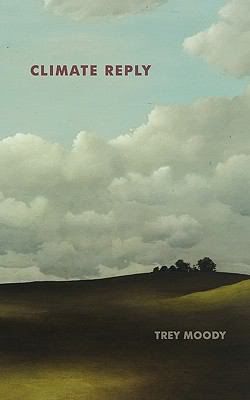 Moody, Trey. Climate Reply. Tuscon, AZ: New Michigan Press, 2010.
Moody, Trey. Climate Reply. Tuscon, AZ: New Michigan Press, 2010.
I've asked the authors of each collection we will read this semester to answer a few general questions about their books in an effort to introduce us to their writing. Our first book, Climate Reply, was written by Trey Moody who, in addition to this collection, is the author of the forthcoming Once Was a Weather (Greying Ghost Press). His poetry has appeared in Best New Poets 2009, Boston Review, Colorado Review, Denver Quarterly, and Washington Square; his fiction is forthcoming in Sonora Review. He lives in Lincoln, Nebraska, where he co-curates The Clean Part Reading Series.
1) Tell us about when you first became interested in poetry. Who were your first poetic influences? When did you begin writing poetry? What do you think poetry does or can do for us today and does this differ from your earliest conceptions of what poetry is/does? etc.
I was in college, about 20, in my first creative writing workshop when I realized I enjoyed writing poetry—at that time much more than fiction or nonfiction. That year I remember being introduced to T. S. Eliot (particularly “The Love Song of J. Alfred Prufrock” and “The Waste Land”) and Ezra Pound (“In a Station of the Metro”), which were very different from my pre-conceived notions of poetry, as I hated reading anything, including poetry, before my second year of college. Thus the love story began, and continues. Although I couldn’t have articulated this then (I got a “B” in my first workshop), what first drew me to poetry such as this was how it taxed my imagination, forcing me to feel like I had never felt—that is to say, uncomfortable, wary, unsure of everything I had convinced myself I believed in. This isn’t so much specific to poetry but rather to all art, and for me it still holds true. As Emily Dickinson remarked: “If I feel physically as if the top of my head were taken off, I know that is poetry.”
2) Give us some background on the creation, development, and gestation of Climate Reply. How does this collection differ from your previous collections or current projects? etc.
I don’t write book-length projects, which is to say I write mainly individual lyrics or shorter sequences. So Climate Reply really began to take shape after looking through some of my favorite poems I had written during MFA school and my first semester of PhD school. After messing with about six other sequences of the same manuscript for a year or two, I finally began recognizing some consistent themes in certain poems, culminating in the final version of the chapbook. So far, this process hasn’t changed in any significant way with other projects.
3) What is your favorite or most memorable poem from the collection we're reading? What about the poem, its process, or its inspiration makes it particularly remarkable for you?
My favorite poem is probably “We Use Spoons Mostly,” mostly because composing that poem—first a notebook entry, then multiple revisions on the computer—taught me many of the things I value in the poetry I’m still writing (and in the poetry I admire). Namely, letting what happens during the act of revision—literally or imaginatively—become a part of the poem.
The most memorable poem is “Climate Reply,” because it was the first time I felt like I had written a poem I would want to read. Here’s the original paragraph from which “Climate Reply” grew and took shape, in a tiny notebook of mine: “Weather as if to recite a speech. Weather as if to read a name. To ask a question, weather to ride the train, to feed the cats, to sleep. Weather to go inside, to weep.” In isolation, kind of awful, right? But like “We Use Spoons Mostly,” this poem, written years earlier, taught me more basic, yet valuable, lessons in regard to revision and the poem’s life.
4) What was the most difficult poem for you to write? Why? How did you overcome or think through these challenges?
Probably “A Feather Protruding from the Mouth.” This thing began as a prose poem, was revised and revised, then lineated, revised, revised, etc. I’m still not entirely happy with it, so I haven’t overcome any challenges, really. I like the “idea” in the poem more than I like the “experience” of the poem—to my mind, a sure recipe for a horrible poem. Hopefully the poem at least works in the context of its surrounding neighbors.
5) What, to your mind, is the overriding concern of Climate Reply? How do specific craft or poetic elements contribute to, intensify, or complicate to this concern?
In an email from a couple of years ago, your gifted teacher, Mr. Ware, put it better than I could have: “this manuscript explores the nature/culture binary and ways in which that binary crumbles when interrogated thoroughly.” The funny—and not-so-funny—thing about that email exchange is that at the time I hadn’t thought about Climate Reply in terms anywhere near as complex or well said as his. As for the second part of the question, I’d say precision—of the word, the line, the sentence, the image, everything—is the element that contributes most to this concern, for me. I want potential readers to be able to comprehend and enter the poem. I don’t want to scare them off right away. But honestly, no matter what I’m writing, I’m obsessed with precision (though, like anything, “precision” is problematic because it’s relative).
No comments:
Post a Comment